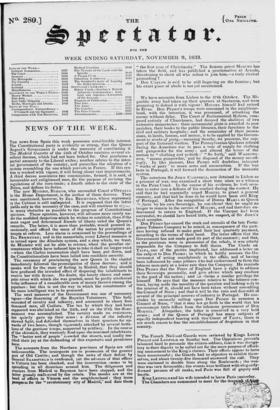We have accounts from Lisbon to the 27th October. The
Mievelite army had taken up their quarters at Santarem, and were preparing to defend it with vigour: MIGUEL himself had retired to Elves. Don PEDRO'S troops were encamped in the neighbour
hood, with the intention, it was presumed, of attacking the enemy without delay. The Court of Ecclesiastical Reform, com
posed entirely of Churchmen, had decreed the abolition of two extensive monasteries : their sacramental plate is awarded to poor parishes, their books to the public libraries, their furniture to the civil and military hospitals ; and the remainder of their possessions, in lands, houses, and money, is to be applied by the Government to works of piety,—meaning thereby, we presume, the support of' the fraternal warfare. The Pennsylvanian Quakers refused during the American war to pass a vote of supply for clothing and gunpowder for the army ; and altered the terms of the motion to " clothing and so forth :" "So forth," said WAsnistoTON, "means gunpowder," and he disposed of the money accordingly. In like manner, Dun PEDRO will doubtless interpret "works of piety" to mean arms and ammunition. If the war lasts in Portugal, it will forward the destruction of the monastic system.
The notorious Sir JOHN CAMPBELL, now detained in Lisbon as a prisoner of war, was examined a short time since as a witness in the Prize Court. In the course of his evidence, he took occasion to enter into a defence of his conduct during the contest. He said that he had repeatedly urged MIGUEL to grant a general amnesty, and that had he done so he would have been still King of Portugal. After the recognition of Donna MARIA. as Queen -le facto by his own Sovereign, he considered that he ought no longer to remain in the service of MIGUEL, and had therufure endeavoured to return to England. If the Usurper hal been successful, we shottld have heard little, we suspect, of Sir JOHN'S loyal scruples. Don PEDRO has caused the stock and utensils of the late Porttfguese Tobacco Company to be seized, in consequence of the partners having refused to make good their last quarterly payment, according to the terms of their bond. The latter affirm that the Government has not made good its part of the contract ; and that, as the provinces were in possession of the rebels, it was utterly impossible for the Company to fufil theirs. The Conde DE TAIPA, one of the parties implicated, has addressed a letter on the subject to Don Pznao; in which he boldly accuses the Government of acting scandalously in the affair, and of having been influenced by some jobbers who had endeavoured to farm the tobacco monopoly at a lower rate than the Company. He reminds Don PEDRO that the Peers of England have a right to address their Sovereign personally, and give advice which may conduce to the good of the nation ; and he claims a similar privilege for himself. He says that the measure relative to the tobacco contract, laying aside the morality of the question and looking oaly to the interest of it, should not have been taken without consulting the Council of State ; and that it will be the ruin and discredit of several of the principal sources of industry in Portugal. He concludes by earnestly calling upon Don PEDRO I°0 summon a
Council of State, " that it may not go forth to the world that his government little differs from the infamous government of Don
MIGUEL." Altogether, the letter is conceived in a very bold strain ; and if the Queen of Portugal has many subjects of equally independent bearing with this Count of TAIPA, there is not much reason to fear the reestablishment of despotism in that country.




















